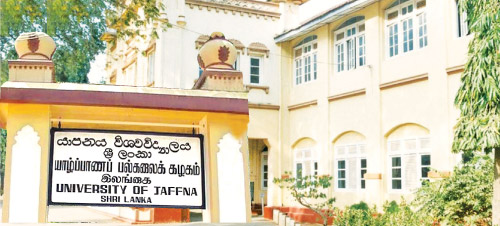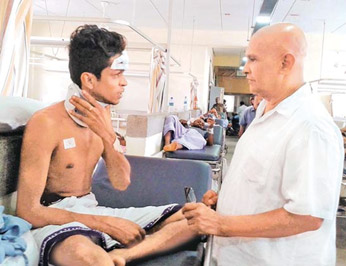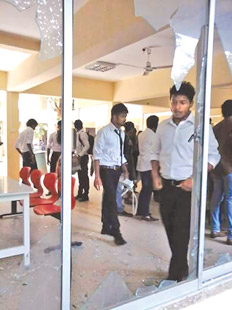|
The Jaffna University, what really triggered the
cross swords
Neutrality is all we need
by Chathuri Dissanayake
Seven years after the guns went silent on the conflict, the reconciliation is
still far from reality. The student clash in the University of Jaffna has woken
leaders of both communities from their slumber to face the unpleasant reality of
the mistrust and cultural divide that exist between the two communities.
 |
Despite the fact that Sinhala students have been enrolled in the Jaffna
University for the last four years, the clash displayed that the university
administration and faculty members seem to have failed to bridge the gap that
exists between the two student groups. A week after the clash, one student still
lies in bed uncertain of his life, while a majority of the Sinhala students
evacuated from university premises on the 16th evening are yet to return to the
university, despite it being officially declared reopened for academic study.
Meanwhile, the student union leader who was arrested following the clash was
later released on bail, despite police recommendation against the move. Two
lecturers from the same faculty signed for his bail, while TNA MP M. A.
Sumanthiran appeared as his legal counsel.
Wake up call
Many, both political and non-political leaders consider the incident as only the
tip of the iceberg, highlighting that this is only a sign of a more serious,
deep rooted problem, and called for an independent investigation by a committee.
The university authorities have already appointed a committee to look into the
incident and the Higher Education Minister, Lakshman Kiriella has wowed to
punish those who are guilty.
However, the political leadership in the Northern Province seems to think
punishing the students is not a step in the right direction. Instead, the
politicians think this should be seen as a wake up call, and called on the
government to take measures to understand the wider issue that resulted
in the clash.
Depending on each faction, the account of the incident at the freshmen’s welcome
on 16th evening, differed. According to one version, the Students’ Union of
Jaffna University led by S. Sasitharan got involved on hearing that Sinhala
students were planning to disrupt the traditional welcome dance by Tamil
students. However, they were asked to step aside by the Dean of the Science
Faculty, who assured that the situation would be looked into. It was alleged
that the Sinhala students disrupted the procession of the Tamil students to
usher in the invitees to the function.
 |
|
Northern Province Governor
Reginald Cooray gives a patient hearing to a student casualty |
Sinhala students however claim, their request to have a joint welcome
performance was turned down by the organizers. They claim, the Dean of the
Faculty had instructed both cultural performances to take place inside and not
outside the hall.
However, seeing that the Tamil performers were preparing to usher in the Dean to
the hall with their dance, the Sinhala performers too decided to do the same,
the Wes dancers. The other Sinhala students waiting to perform were then
attacked by Tamil students, they allege. Who struck the first blow remains a
mystery.
However, questions about how the varsity handled the situation have been raised,
while Sinhala students and parents raised concerns over the impartiality of the
administration.
“The student union leader who was arrested was driven to the police station by a
university vehicle. The bail application was signed by the Registrar and a
lecturer of the university, while M. A. Sumanthiran, a leading lawyer and a
Member of Parliament appeared on his behalf. Will our children get the same
treatment in a similar situation in Jaffna?” asks Anura Gunerathne, President of
the newly formed Association of Parents of Affected Students of the University
of Jaffna.
Make it safe for our children
- Parents
The Association publicly called on the government to ensure security for Sinhala
students within and outside the University. Parents of Sinhala students; a
majority of whom are enrolled in the Science and the Management Faculties of the
Jaffna University have refused to send their children back to the campus until
their security can be assured. Holding a media conference last Thursday, the
parents demanded that police or army should be tasked to establish security in
the area, while also creating an internal campus environment conducive for
learning. They insisted that all second and third year students, sans university
provided accommodation, should be given those facilities, instead of being asked
to find accommodation outside. If these requirements cannot be fulfilled, the
parents demanded that they be given admission to southern universities .
 |
|
Damaged windows after the
brawl |
The parents have already met a number of political leaders including Prime
Minister Ranil Wickremesinghe who has assured them the security of their
children. The parents have been informed that a meeting will take place on
Monday, between university administration and other responsible parties to
discuss the matter, Gunerathne said.
Difficult demands
However, Vice Chancellor, Jaffna University Prof. Vasanthy Arasaratnam claims,
she has not been informed of the meeting by any authority. According to her, the
demand for accommodation facilities for senior students is difficult to meet.
Further, the faculty members believe the students should integrate with the
community to experience the culture, she said.
Last week, the university also took the decision to reopen seven faculties,
except the Faculties of Arts, Management and Science, where a large number of
Sinhalese students are enrolled.
However, in a letter written by the Sinhala Students Unity of Jaffna University
to the University Grants Commission, they highlight that a house rented out by a
group of Sinhala students has been attacked following the student evacuation in
the aftermath of the clash on Saturday. The students highlighted a number of
other grievances in the same letter. A repeated appeal by them is to increase
the number of Sinhala members in the university’s administration cadre. While
appealing to the UGC to ensure their safety the students have stated that the
University has on occasions failed to conduct matters impartially. Another
accusation against the university authorities is the lack of documentation in
the Sinhala language. According to the students the university documents and
forms such as bursary and Mahapola application forms are only in the Tamil
language.
Investigations
The university is conducting a disciplinary inquiry into the matter and has
stated that wrongdoers would be punished. Kiriella too reiterated it in his
statement made to the Parliament regarding the incident. However, Members of the
Northern Provincial Council believe, punishing the students would only make
matters worse. They say that the incident is only a trigger and highlighted
issues of a more serious nature in the northern community. In a joint statement
Chief Minister, Northern Province C. V.Wigneswaran, and Leader of Opposition
S.Thavarajah, called on the Central Government to set up a ‘full-fledged’
Commission of Inquiry to conduct an in-depth probe into the clash. They stressed
that the clash was a manifestation of deeper problems faced by the Tamil
community in the North.
“We must first try to understand the underlying causes that led to their violent
behaviour. Thereafter, we must determine ways and means of dealing with such
underlying causes and implement them. This would ensure that such incidents will
not be repeated,” the statement said.
All groups have equal rights
All ethnic and religious groups have the right to practise their religious
and cultural rituals regardless of whether they are a majority or minority
group, Governor, Northern Provincial Council, Reginald Cooray said, upholding
the Sinhala students’ request to perform the cultural dance.
“Whatever the dominant ethnicity or culture, all groups have this right. It is
entertained in the southern parts in Sri Lanka. In southern areas we don’t see
any hindrance to practise Hindu rituals, Christian rituals or any others. In
Wellawatte, they perform all cultural rituals without any obstructions
whatsoever, and it should be reflected in the North too,” he elaborated.
Coorey pointed out that the incident that occurred in the Jaffna University may
have been politically motivated, and that such incidents are natural when the
country is going through a transitional period. “We should not give into such
situations, we should try and work together to achieve reconciliation,” he said,
emphasizing that Sri Lanka has a long way to go and much to achieve in
reconciliation.
He said that parents’ concerns over the security of their children in the
university are legitimate and both central and provincial authorities should
take proper steps to ensure that security of the students is established. He
asserted that disciplinary action should be taken against all students involved
in the incident, while law and order should be established in the areas to
enable the return of the southern students.
An independent Commission of Inquiry needed
The incident that occurred is not an isolated one, but a manifestation of the
general feeling in the community, and warrants a full investigation, S.Thavarasa,
Leader of Opposition, Northern Provincial Council said, speaking to the Sunday
Observer.
According to him, Sinhala and Buddhist cultural values are being imposed upon
the Jaffna community, which has created a resistance against the Sinhala
community. These views were also reflected on the joint statement issued by
Thavarasa and Chief Minister C. V. Wigneswaran which called on the government to
conduct ‘a full fledged Commission of Inquiry into all aspects of the
incidents’. The statement highlighted, ‘merely condemning such incidents or
punishing certain students after an inquiry (internal) would not bring about
understanding and unity.’
The Provincial Councillors called upon the government to find out the underlying
cause of what led to the violent behaviour, which can then lead to solutions.
They have also claimed that the change in ethnic composition of the students,
where the majority ethnic group in some Faculties is Sinhalese, which is a
contributing factor for the frustrations felt by the community.
The statement alleges that, the large numbers of students admitted to the Jaffna
University from other provinces who are, ‘ bent on forcing their art and
cultural background on the Jaffna soil’ may have also contributed to the recent
incident.
However, the University Grants Commission (UGC) has highlighted that admission
to the University is given based on merit and the quota system, similar to all
other national universities in the country. |

